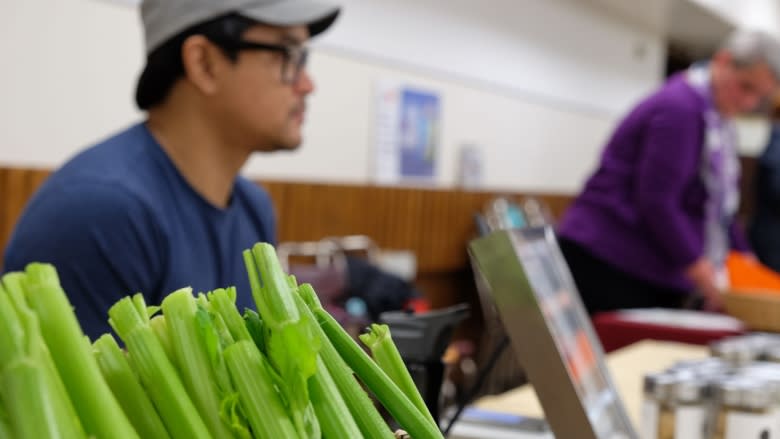Lack of funding threatens Knox Community Kitchen
A subsidized commercial kitchen that helped launch several successful local food businesses is closing next month.
The Knox Community Kitchen will close on Sept. 15 due to a $50,000 shortfall in funding. The group also needs to overhaul how it is run, kitchen manager Natasha Ross told CBC News.
"If we were to get the funding tomorrow, we would stay open, but we would still need to take a step back and regroup, because we were still kind of scrambling [to keep] it together," she said.
How the kitchen was born
The kitchen began in 2013 after Ross identified a need in the community to help small operators wanting to break into the Manitoba food scene, particularly within the city's immigrant communities where newcomers were missing their traditional foods.
"We're kind of a gateway for a lot of newcomers and immigrants and it's a densely populated area," Ross said. "There was a market, a Central Park market, that did receive some public funding and what people were saying was they needed a commissary or kitchen where they could make their traditional foods and sell them at the market.
"A lot of people are homesick for that food."
Government grants and private donations funded the kitchen, which cost $450,000 to set up. The space was rented out for $10 an hour by businesses including Oh Doughnuts and Shut Your Pie Hole, which have since expanded to their own storefronts and commercial kitchens.
"You wouldn't believe the food that comes out of this kitchen — it's incredible, and such a diversity of things. There's breads, there's Philippine food, African food — we have a young group of Africans and they are just this bustling group of young people and they make the most incredible food."
The kitchen has run as a collective for the past three years, with people bartering their services in exchange for cooking time while community and professional mentors helped others navigate the local food scene.
When the kitchen lost its funding for a full time co-ordinator in January2016, Ross said, they tried to hold their ground and run the kitchen with Ross taking a part-time salary.
"It just proved too big of a task, without proper funding and staffing … Running a shared kitchen is an incredible amount of work and we did not anticipate how much work it would be," Ross said.
Other problems noted
Lord of the Pies owner Dustin Watson says there were other issues aside from funding, including the kitchen's organizational structure, a collective model that didn't exist when he started working out of the kitchen in January.
"I was given a brochure on Day 1 that said the collective existed and that it was $10 an hour, but then I was told the collective didn't exist and the rates were different."
Ross said the collective model was being wound down when Watson joined the kitchen earlier this year, and it was explained at the time that no one was allowed to join.
Watson decided to go ahead as the kitchen was in good shape, had enough room and was still less expensive than others.
Watson said he talked to media about the kitchen's closure earlier this week and after doing so, received an email from Ross asking him to vacate the kitchen immediately due to "misleading comments."
"It was shocking. It was disheartening," said Watson, who said he was looking at the next step of moving out into his own kitchen, but wasn't quite ready. He said his comments to other media weren't threatening or negative.
"It was definitely my opinion … but I can understand her side of it."
Watson said he has since found a temporary space and will continue making pies until he's ready to move into his own space.
Ross confirmed she sent an email asking Watson to leave early, and said it was mostly due to him owing payment for July and for fostering a "negative culture" during a time of turmoil.
Loss to the community
Watson said losing the kitchen is a loss for the community and, despite his disagreements with management, credits his time there as being invaluable to launch his pie business, thanks to the kitchen's affordable rates, the mentorship from others and the space to make his food.
"It's almost become an institution for small business in Winnipeg. We were lucky when we got in there, and I think we got in there because we had a new idea, a product, something that no one was really doing at the level we were doing it.
"Every time I go there, I learn something."
Knox Community Kitchen is doing its best to help current kitchen users find new space, Ross said. "There aren't a lot of commercial kitchens in the city that are 24 hours, so we have bakers who need that overnight shift."
Costs to rent the kitchens that are available are much higher, she added.
Still, the closure of the kitchen has propelled a couple of businesses to make the step into their own space, "and that's a great outcome."
Ross said no matter what, the kitchen will still be used for various community programming.



